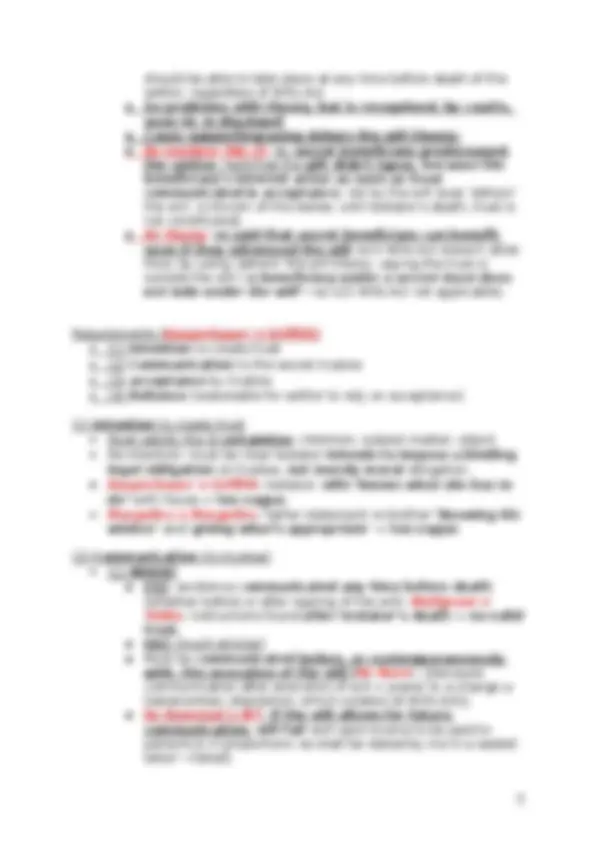



Study with the several resources on Docsity

Earn points by helping other students or get them with a premium plan


Prepare for your exams
Study with the several resources on Docsity

Earn points to download
Earn points by helping other students or get them with a premium plan
Community
Ask the community for help and clear up your study doubts
Discover the best universities in your country according to Docsity users
Free resources
Download our free guides on studying techniques, anxiety management strategies, and thesis advice from Docsity tutors
The concept of secret trusts, which are exceptions to the normal requirements for testamentary gifts or trusts under the wills act 1837. Secret trusts can be used to keep gifts or trusts secret, to benefit someone undecidedly, or to get around the strictures of the wills act. The mechanisms and definitions of fixed and discretionary secret trusts, their standard and burden of proof, and the justification and rationale for enforcing them.
Typology: Study Guides, Projects, Research
1 / 3

This page cannot be seen from the preview
Don't miss anything!


Exception to s9 Wills Act 1837 Normal requirements for testamentary gift or trust: s9 Wills Act compliance ((1) in writing, signed by testator; (2) intention through signature to give effect to will; (3) presence of 2 or more witnesses; (4) witnesses attest). Why use them? Wills = public documents. Eg way to benefit someone/purpose you wish to keep secret (eg mistresses, illegitimate children, political parties). Or if undecided re who to benefit. OR to get around strictures of Wills Act: eg if want to change mind, easier, don’t need to make new will. Mechanism/definition FST: outright gift in the will to intended trustees. Trust not mentioned in will. o Eg: will says £100,000 to Arthur’; Arthur has agreed to hold on trust for B. o On the face of it, looks like an absolute gift. o If secret trusts fails: the trustee may may take the property absolutely (as, on face of will, it’s an absolute gift). HST: gift in will stated to be ‘on trust’ or equiv; but details kept secret. o Eg, will says: ‘£100,000 to Arthur to hold on the trusts I have communicated to him’. o Only firmly established/recognised in Blackwell v Blackwell, HL ( 1929). 2 justifications for recognising HSTs: (1) broader view of ‘fraud theory’, also applies to HSTs (see below). (2) Dehors the will theory. Both cases: trustee is separately informed by the testator, inter vivos, of the trusts. Standard & burden of proof Re Snowden: Burden on personal claiming the trust exists; standard: balance of probabilities (civil standard). Justification/rationale for enforcing secret trusts ‘Fraud theory’ (re FST) o Maxim: equity will not permit a statute to be used as an instrument for fraud. So can’t permit s9 Wills Act to be used to commit a fraud (i.e. to defraud the intended beneficiary).
o McCormick v Grogan : equity won’t let Wills Act requirement be used by intended trustee to fraudulently keep trust property. If somebody induces a settlor to leave them property under a FST, and then uses the requirement of Wills Act to try to and keep it for themselves (saying there’s no valid trust because terms not in signed writing etc) courts won’t allow that. o Fraud theory extended to HST, Blackwell v Blackwell : o Not fraud in same way as FST: because the existence of the trust is on face of will, so trustee can’t take property absolutely for himself. o Take a broader view of fraud; if a half-secret trustee doesn’t carry out the agreed trust, the property is held on RT for the testator’s residuary legatee, rather than going to secret beneficiar y. Had the secret trustee not agreed to the trust, then the testator could have made other provision for the beneficiary. So would be a type of fraud perpetrated against settlor & beneficiary, because failure to carry out trust property goes to residuary legatee instead of secret beneficiary = fraud , the agreement by trustee denied chance of testator to bequeath the property to the beneficiary in another way. ‘ Dehors the Will Theory’ (applies to FSTs and HSTs): o Blackwell v Blackwell, HL : Secret trusts = lifetime trusts, not testamentary trusts; they operate outside (dehors) the will ; and thus not subject to Wills Act. o Viscount Sumner: ‘communication to the legatee’ + ‘acquiescence’ ‘removes the matter from the provision of the Wills Act’. o Makes sense in some way: as communication & acceptance take place inter vivos. o But, why doesn’t make sense : inter vivos trust must be constituted during settlor’s lifetime; but secret trusts are only constituted upon death of settlor, via their will (in this sense, they are more like testamentary trusts) ; are completely revocable until death unlike inter vivos trust. o Although the trust terms arise outside the will; constitution only takes place by virtue of the Wills Act , legal title passing to the trustees on death. o P Critchley points out: the beneficiary is dependent upon the settlor dying solvent, without having changed their mind. o Argument is that: the will doesn’t create the trust, is merely the device for constituting it by transferring legal title to the trustees; BUT, the trust is not constituted until death. o Also, ‘dehors the will theory’ would apply to both FSTs and HSTs; but doesn’t fit with the timing of communication for HST: HST doesn’t allow communication after the execution of the will (because that would void provisions of Wills Act); but, if secret trusts operate ‘dehors’ the will, then communication